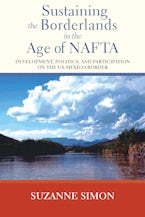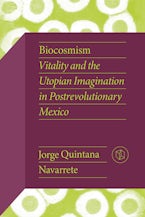- Home
- Sustaining the Borderlands in the Age of NAFTA

Sustaining the Borderlands in the Age of NAFTA
Development, Politics, and Participation on the US-Mexico Border
Although the key to the side accords' anticipated success lay in their ostensibly generous encouragement of a participatory politics and sustainable development opportunities, Sustaining the Borderlands reveals that the Mexican border populations for which they were largely created are effectively excluded from participating due to the ongoing online, territorial, class, and cultural barriers that shape the borderlands. Rather than experiencing the side accords and their companion institutions as transparent and accessible, residents experienced them as opaque and indecipherable. Simon concludes that the side accords have failed to deliver on their promise of bringing democracy to Mexico because practical mechanisms that would ensure their effective implementation were never put in place.
NAFTA took effect at a time when Mexico was undergoing a democratic transition. The treaty was supposed to encourage this transition and improve environmental and labor conditions on the US-Mexico border. This book demonstrates that, twenty years later, the promises of NAFTA have not come to pass.
Suzanne Simon is Assistant Professor of Anthropology at the University of North Florida.
"Simon's study unveils the perverse nature of [a] discourse of participation, sustainability, and stewardship. The burden, ultimately, falls not to the state but, rather, to the poor and marginal, who must be unrelentingly resilient. Sustaining the Borderlands in the Age of NAFTA attests to their struggles in a borderland world that is rapidly turning into an environmental wasteland."
--American Anthropologist
"For applied and practicing anthropologists and for teachers and students interested in social justice initiatives, this is recommended reading that imparts valuable lessons."
--American Ethnologist
"Simon makes an original contribution to our understanding of movement politics along the United States-Mexican border. The treatment of grassroots organizations of workers and residents in northern Mexico is especially strong."
--Paul Hart, author of Bitter Harvest











